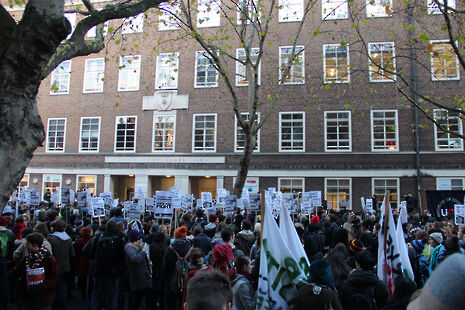Cops off campus: the problem with student protest
Comment Editor Louis Degenhardt wades into the #copsoffcampus debate, taking issue with tactics used by student protestors

Show someone photographs of the Cops Off Campus demonstrations out of context, and they’d find it pretty hard to work out just exactly what the protests were about. Free education? An anarchist call to arms? A Mandela memorial march? The placards were almost as incongruous as the chants, which condemned all police as "bastards" and called for "justice" for Mark Duggan.
I write this piece somewhat reluctantly: I share most of the grievances that provoked many of the protestors to take action. I don’t think it’s OK that the police are trying to spy on student activity in Cambridge. Nor do I think it’s OK that seemingly innocent, peaceful student protestors have been arrested and allegedly assaulted by members of the police force.
But none of this excuses the immature and entirely inappropriate means taken up by many students to try and further their cause. I doubt that recent police action towards students has much public support – the fact that police spying in Cambridge made The Guardian’s front page suggests it is not only young people who hold concerns about the actions of law enforcers. Questions of how we are policed, and when the use of force becomes acceptable, are not just relevant to students, but lie at the very heart of our liberal democratic society.
So it saddens and also frustrates me to see students taking up action that not only alienates support, but actually undermines it. In a protest aimed at ending police intimidation and violence – that was also ironically distinctly lacking in cops on campus – what kind of message does donning a balaclava send to the previously unaware, undecided viewer watching clips of the protest on the news? Why do some students feel it is acceptable to denounce all 30,000 police officers in the UK – most of whom surely go into the forces with a sense of public duty – as scum, bastards and liars?
Student protest unfortunately seems to have been hijacked, taken up as a raison d’etre by a small number of moralistic students, who are there as much for the image and sense of self-worth they derive from protesting as for their cause. It is no wonder that the vast majority of the student body has become completely depoliticised, when they are lectured about 'their cause’ that is decided for them by a small group, who are entirely unrepresentative of their views and experiences.
I wonder how many of the protestors wrote to their MPs about the issue, petitioned for police reform, or lodged an official complaint against them – I worry that the number is frighteningly low.
I am almost surprised by how Establishment I sound here. I have been appalled by the actions of police in recent weeks. The conduct of the Metropolitan Police in its treatment of University of London student occupiers must be criticised in the strongest terms, and I sympathise with the view that Met brutality and lack of transparency has become a worrying trend. This is exactly why I feel it is more important than ever to hold the body to account through legitimate means, rather than through direct, sometimes legally dubious, action, which alienates the vast majority of students.
Raising the profile of legitimate student grievances should be a priority in campaigning for policing reform and accountability. It is shocking that the NUS has chosen almost entirely to ignore the fact that students are being injured by unprovoked police officers. In its current form, though, student action strikes me as unlikely to win mass support or even gain much attention. National media coverage of the Cops off Campus demonstrations was noticeably lacking. Given the nature of the protests, perhaps that was for the best.
 Features / Should I stay or should I go? Cambridge students and alumni reflect on how their memories stay with them15 December 2025
Features / Should I stay or should I go? Cambridge students and alumni reflect on how their memories stay with them15 December 2025 News / Cambridge study finds students learn better with notes than AI13 December 2025
News / Cambridge study finds students learn better with notes than AI13 December 2025 News / Dons warn PM about Vet School closure16 December 2025
News / Dons warn PM about Vet School closure16 December 2025 Comment / The magic of an eight-week term15 December 2025
Comment / The magic of an eight-week term15 December 2025 News / News In Brief: Michaelmas marriages, monogamous mammals, and messaging manipulation15 December 2025
News / News In Brief: Michaelmas marriages, monogamous mammals, and messaging manipulation15 December 2025








